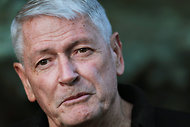Mr. Murdoch named a former newspaper executive, Julian Clarke, to run News Corp. Australia, the country’s dominant newspaper publisher, replacing the former pay-television boss, Kim Williams, who announced his retirement after less than two years in the top job.
“I want to thank him for his unwavering commitment and the blood, sweat and tears he has put into News Corp. Australia,” Mr. Murdoch said in a statement on Mr. Williams’s retirement.
Some media analysts said the change of executives was more likely to be linked to the split of News Corp. into its entertainment and publishing units earlier this year, than to politics and the heated election campaign.
Crikey.com.au, a news Web site, said there had been internal unrest in News Corp. Australia over Mr. Williams’s cost-cutting and structural changes and relief in newsrooms at his departure.
Paul Xiradis, managing director at Ausbil Dexia, the biggest investment management shareholder in News Corp.’s Australian-listed shares, also said Mr. Williams’s departure was more likely about business.
Leading up to the News Corp. split, “there was a fair bit of work involved in that. But now implementing the ongoing strategy, maybe he wasn’t committed there full-time,” Mr. Xiradis said, referring to Mr. Williams.
Mr. Rudd said Friday that the shakeout had come after Mr. Murdoch sent a key lieutenant, Col Allan, from New York to Australia to increase attacks on his government and its high-speed broadband plan — projected to cost 38 billion Australian dollars, or $35 billion — before the Sept. 7 election.
“The message delivered very clearly to them was ‘go hard on Rudd. Start from Sunday and don’t back off,”’ Mr. Rudd said.
Margaret Simons, a media analyst at Melbourne University, said News Corp. had long been against the Labor government under both Mr. Rudd and his predecessor, Julia Gillard.
“Col Allan’s arrival was crucial,” she said. “I’m hearing Col Allan was sent to report back on how Kim Williams was leading the local operation. When I heard he was arriving, it was clear it couldn’t possibly be good for Kim.”
News Corp. did not respond to requests for comment on Mr. Rudd’s allegations. But there is no question that the Murdoch-controlled media outlets in Australia want Mr. Rudd defeated in the September elections.
The leading Sydney newspaper, The Daily Telegraph, on Monday ran a front-page headline saying, “Kick this mob out” over a photo of Mr. Rudd on the first day of an election campaign.
Mr. Murdoch’s main daily in the state of Queensland on Friday continued the anti-government campaign, with the front page headline “Send in the clown” over a photograph of Mr. Rudd and his surprise candidate for a key seat, a former popular state premier, Peter Beattie.

Article source: http://www.nytimes.com/2013/08/10/business/media/murdoch-shakes-up-news-corps-australian-operation.html?partner=rss&emc=rss




